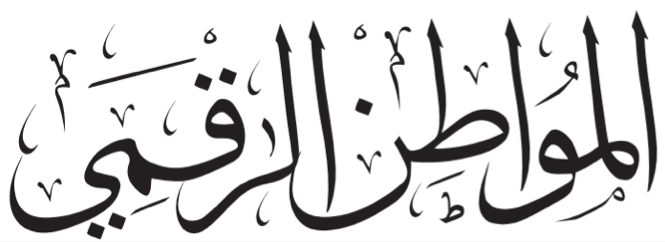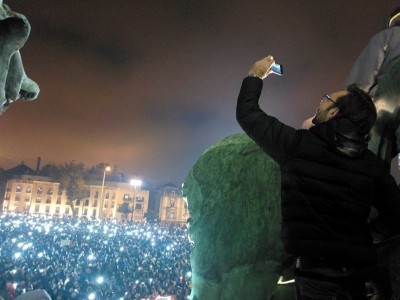
Digital Citizen is a biweekly review of news, policy, and research on human rights and technology in the Arab World. This edition looks at governments seeking to crack down on binaural beats, declining freedoms in Bahrain, Tunisia, and Egypt, and the ongoing battle between governments and social media companies.
Lebanon
Two years after its launch in 2012, the Virtual Museum of Censorship continues to document violations of the right of free expression committed in Lebanon. Global Voices’ Thalia Rahme interviewed the museum about the work they are doing to support censored artists and advocate for legal reforms that support free expression.
Lebanon’s Minister of Justice called for legal measures against “digital drugs”, a brand of digital audio track (better known as binaural beats) that claims to have a drug-like effect on the listener.
Bahrain
Jailed for offending state institutions on Twitter, prominent human rights activist Nabeel Rajab was freed on bail on Nov. 2, and his trial was adjourned until Jan. 20. Rajab was arrested for tweeting about reports that members of the Bahraini Interior Ministry had joined the self-proclaimed Islamic State.
Another prominent human rights activist, Zainab al-Khawaja, was arrested on Oct. 14 for ripping up a photo of King Hamad bin Isa Al Khalifa in court. Charged with insulting the king, al-Khawaja risks seven years in prison.
On Oct. 13, Privacy International filed a criminal complaint on behalf of three Bahraini activists living in the UK, targeted by the spyware FinFisher supplied by British company Gamma.
Bahraini activist Ali Abdulemam penned a piece on “speaking out about democracy in the golden age of surveillance” for the Irish Times.
Egypt
On Oct. 14, a student was arrested and investigated on suspicions that he “belonged to a terrorist group,” “[was] managing Facebook pages inciting against the military and police,” and “misusing the Internet and [his] computer.” According to state news agency MENA, a woman was arrested on October 22 for managing a Facebook page that “incites violence against the police and army.” The woman allegedly confessed to being a member of the Muslim Brotherhood.
The Cairo Administrative Court will soon hear a lawsuit filed by a lawyer to ban Facebook and Twitter until they acquire legal permission to operate in Egypt, on Nov. 18. Citing security concerns, the lawyer filed the suit in late August.
The Ministry of Interior stopped its Internet surveillance program in response to a lawsuit filed by a number of human rights groups. According to a security official, the ministry has “frozen” the surveillance program until the court issues a decision.
Editors of major Egyptian newspapers announced their support, as well as a unified media strategy, for the state and its war on terror.
Morocco
In September, police detained Briton Ray Cole and Moroccan Jamal Wald Nass for “homosexual acts”. Moroccan police used photos found on Cole’s mobile phone to convict and jail the two men.
Oman
Omani writer and activist Saed al-Darodi is believed to be held incommunicado after being summoned to appear before a local police division in Dhofar, a governorate in southern Oman. According to the Gulf Center for Human Rights, al-Darodi is held in connection to a Facebook post he published on Oct. 7 and entitled “I’m not Oman….I’m Dhofari”.
Saudi Arabia
On Oct. 27 a court in Riyadh sentenced three lawyers to prison sentences ranging from five to eight years for criticizing the Ministry of Justice on Twitter. The Saudi lawyers were also barred from travel and from appearing in the media or using social networking sites.
A day later, women’s rights activist Souad Al-Shammari was arrested while she was being interrogated over comments she posted on Twitter. She faces charges of “calling upon society to disobey by describing society as masculine” and “using sarcasm while mentioning religious texts and religious scholars.”
On Nov. 3, human rights defender and blogger Mikhlif Al-Shammari was sentenced to two years in prison and 200 lashes.
Saudi Arabia’s grand mufti called Twitter “the source of all evil and devastation,” describing the microblogging site as being used to “promote lies, backbite and gossip and to slander Islam.”
Jailed blogger Raif Badawi received PEN Canada’s One Humanity Award. Badawi is serving a ten-year prison sentence for founding the Liberal Saudi Network website.
As in Lebanon, Saudi authorities are exploring measures to prevent the arrival of “digital drugs” or binaural beats to the Kingdom.
Tunisia
Jabeur Mejri, who was previously jailed for posting prophet Muhammad cartoons on Facebook, was set free on Oct. 15, after serving sevent months of an eight-month prison sentence for “insulting” a court employee.
United Arab Emirates
The trial of activist Osama al-Najjar continued with two hearing in mid and late October. Al-Najjar is being prosecuted for tweeting about torture in the UAE. The court is due to issue a verdict on Nov. 25.
Speaking at the Oslo Freedom Forum, Palestinian blogger and activist Iyad el-Baghdadi revealed that he was deported from the UAE last May, where he had resided throughout his life. An active Twitter user, el-Baghdadi went silent on April 30. On that same day, he was summoned by the UAE authorities and was given two options: Detention in the UAE or deportation to Malaysia. El-Baghdadi chose Malaysia and arrived in Norway, where he is seeking political asylum, in late October.
Yemen
Houthi rebels in Yemen continue attacking news providers. On Oct. 17, five gunmen claiming be members of the group attacked Aleshteraki, a online newspaper affiliated with the Socialist Party, and kidnapped its editor for several hours before releasing him.
In other news:
-
In September, despite a wide range of objections from more than two dozen civil society organizations, the council of ministers of the Arab League approved a statute establishing an Arab Court of Human Rights. If instituted according to the approved statute, Arab citizens will not be able to bring cases to the court without the support of their governments. The International Commission of Jurists called this “a gross departure from the human rights courts established in other regions of the world.”
-
The World Economic Forum blog has published a piece enumerating “10 facts on Internet use in the Middle East.”
From our partners:
-
SMEX launched a research series mapping the emerging legal framework for free expression online that will run through the end of the year. They are actively seeking feedback on ideas in the piece, especially as they relate to the potential for legal reform on digital rights in the region.
Upcoming events:
-
The MENA ICT Forum will take place Nov. 12-13 in Amman, Jordan.
Digital Citizen is brought to you by Advox, Access, EFF, Social Media Exchange, and 7iber.com. This month’s report was researched, edited, and written by Afef Abrougui, Ellery Roberts Biddle, Jessica Dheere, Mohamad Najem, and Jillian C. York and translated into Arabic by Mohamed ElGohary.




1 comment